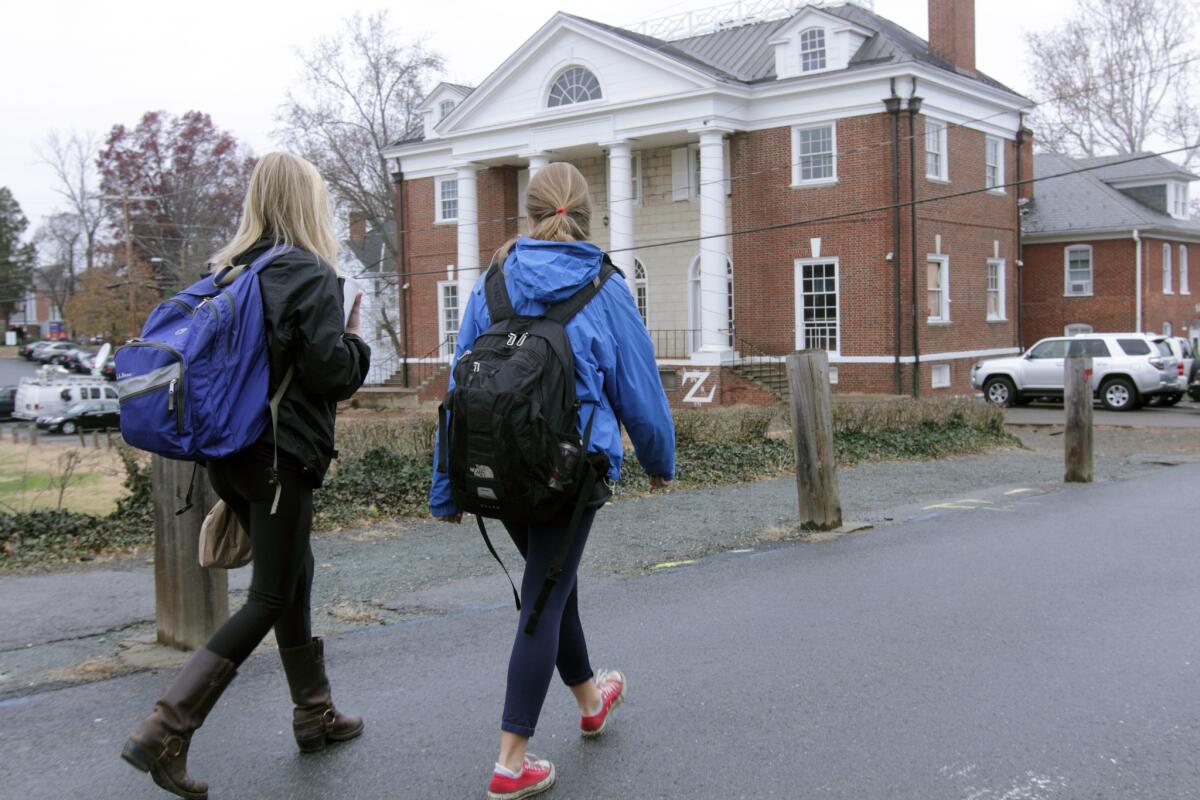Fallout from Rolling Stone feared by advocates for sex assault victims

- Share via
The retraction of a Rolling Stone article about an alleged gang rape has sent reverberations around the journalism industry and raised concerns about its effect on rape victims. An independent report by the Columbia Journalism Review found the piece was a “journalistic failure that was avoidable.”
The details in the article, which centered on one woman named Jackie and her accusations involving an alleged gang rape at a fraternity house on the University of Virginia campus, were quickly called into question. School officials immediately turned the case over to the police, whose investigators found a number of serious discrepancies in the article’s timeline.
“The failure encompassed reporting, editing, editorial supervision and fact-checking,” wrote the authors of the Columbia report. “The magazine set aside or rationalized as unnecessary essential practices of reporting that, if pursued, would likely have led the magazine’s editors to reconsider publishing Jackie’s narrative so prominently, if at all.”
In moving forward, editors at Rolling Stone said they are committed to several recommendations about journalistic practices outlined in the report. Still, some rape victim advocates fear damage from the piece could have a lasting effect on survivors.
Here are some questions and answers about the case.
What happened with this article about rape?
A year ago, reporter Sabrina Rubin Erdely began looking into campus sexual assaults. This came at a time when several high-profile rape cases made headlines on campuses such as Florida State and Yale. In these instances, there were reports about how universities mishandled investigations and how alleged assaults were never reported to law enforcement. Erdely found Jackie, who told her that in September 2012, during her freshman year, she attended a frat party where she was the alleged victim of a violent rape.
The article sparked outrage and anger from advocates and university officials. But shortly after its publication, questions came to the forefront about its legitimacy.
At no point in her reporting did Erdely or her editors contact the men Jackie said raped her. Moreover, it was revealed after the article’s publication that the fraternity never held an event during the time frame described by Jackie.
Rolling Stone managing editor Will Dana issued an apology in December, saying the magazine could not explain the discrepancies.
“We made a judgment -- the kind of judgment reporters and editors make every day. And in this case, our judgment was wrong,” Dana said on social media at the time. “We should have either not made this agreement with Jackie, or worked harder to convince her that the truth would have been better served by getting the other side of the story. That failure is on us -- not her.”
Has something like this occurred before?
Yes.
Rolling Stone is not the first major publication to run into problems with an article that ended up being retracted. There have been several cases in particular that made national headlines.
In 1980, Washington Post reporter Janet Cooke wrote a piece titled “Jimmy’s World” about a child who lived in southeast Washington, D.C., and was addicted to drugs. The harrowing account of the 8-year-old-boy won a Pulitzer Prize for the newspaper. But after intense scrutiny and no signs of the young boy, Cooke admitted that her piece was total fabrication. The Pulitzer was returned.
In the other case, Jayson Blair, a reporter for the New York Times, plagiarized articles and fabricated stories on several occasions, leading to Blair’s resignation in 2003 and the newspaper to print a lengthy piece correcting his reporting.
And in 2002 and 2003 Judith Miller wrote several stories for the New York Times suggesting that Saddam Hussein had acquired weapons of mass destruction. These stories were based largely on now-discredited information provided by an Iraqi politician and the paper eventually discredited the reports.
Could this failure in reporting prevent victims from coming forward in the future?
The attention the Rolling Stone article generated has caused some concern among victim advocates.
“Going to the media is not at all easy for victims.... It’s not at all something to take lightly,” said Sharmili Majmudar, executive director of Rape Victim Advocates, a Chicago-based nonprofit that assists sex assault victims. “There can be fallout when speaking out and this incident has magnified just that.”
Majmudar said she is concerned about Jackie -- whose identity was not in the Columbia report -- and women who are in similar situations down the road.
“Sexual violence is something that’s real and happens often on college campuses. Survivors must be protected and feel that they can speak out,” Majmudar said. “I just, again, fear that the fallout from this could affect future survivors from telling their stories.”
Sheila Coronel, a dean of academic affairs at Columbia University, emphasized in comments Monday that the alleged victim is not at all to be blamed.
What about the fraternity where this allegedly occurred?
Within Erdely’s report, she notes that the alleged sexual assault took place at UVA’s Phi Kappa Psi fraternity.
On Monday the national chapter of the fraternity said it planned to pursue “all available legal action against the magazine.”
“Clearly our fraternity and its members have been defamed, but more importantly we fear this entire episode may prompt some victims to remain in the shadows, fearful to confront their attackers,” said Stephen Scipione, president of the Virginia Alpha Chapter of Phi Kappa Psi. “If Rolling Stone wants to play a real role in addressing this problem, it’s time to get serious.”
kurtis.lee@latimes.com
More to Read
Sign up for Essential California
The most important California stories and recommendations in your inbox every morning.
You may occasionally receive promotional content from the Los Angeles Times.














